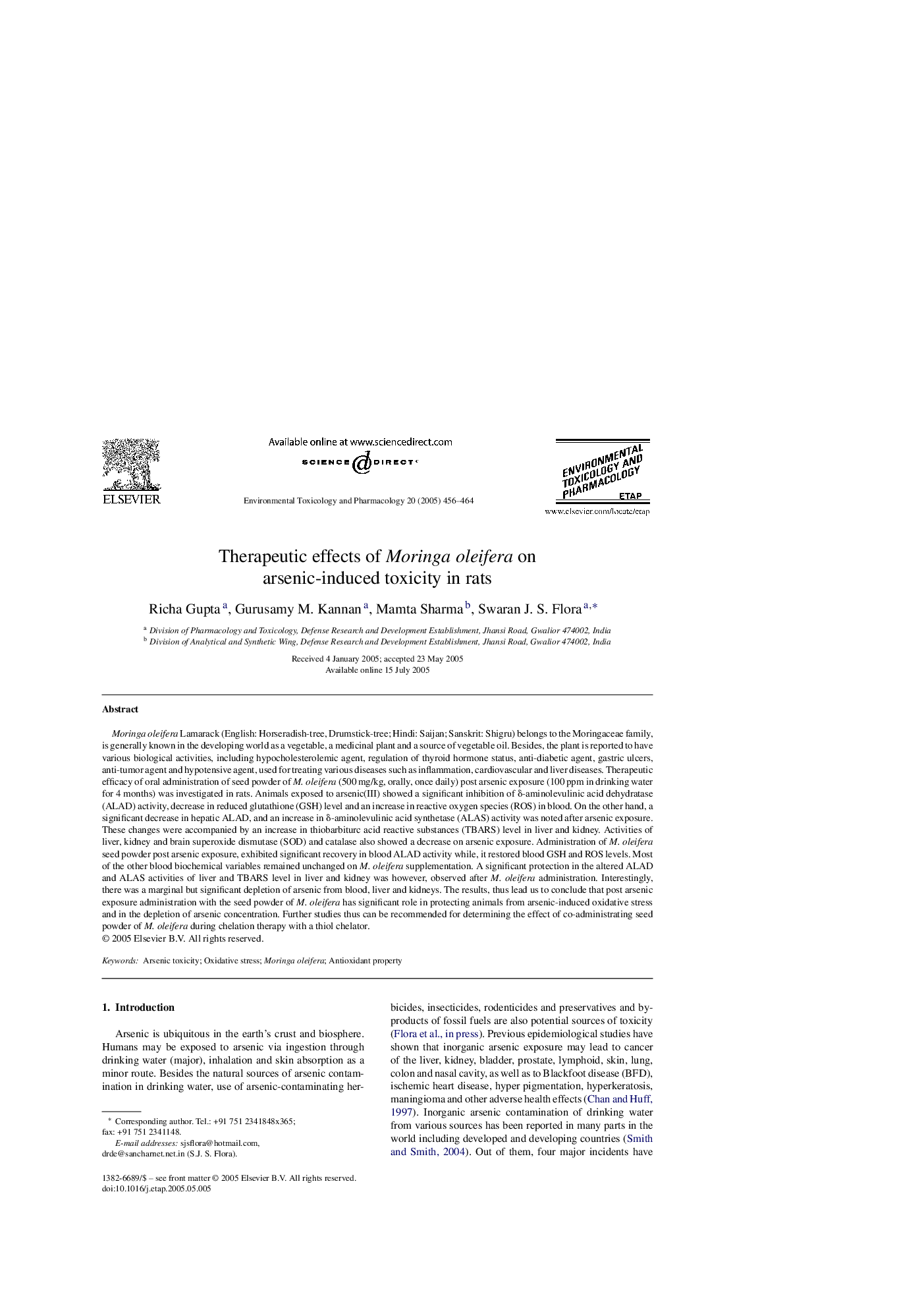| کد مقاله | کد نشریه | سال انتشار | مقاله انگلیسی | نسخه تمام متن |
|---|---|---|---|---|
| 9030038 | 1561706 | 2005 | 9 صفحه PDF | دانلود رایگان |
عنوان انگلیسی مقاله ISI
Therapeutic effects of Moringa oleifera on arsenic-induced toxicity in rats
دانلود مقاله + سفارش ترجمه
دانلود مقاله ISI انگلیسی
رایگان برای ایرانیان
کلمات کلیدی
موضوعات مرتبط
علوم زیستی و بیوفناوری
علوم محیط زیست
بهداشت، سم شناسی و جهش زایی
پیش نمایش صفحه اول مقاله

چکیده انگلیسی
Moringa oleifera Lamarack (English: Horseradish-tree, Drumstick-tree; Hindi: Saijan; Sanskrit: Shigru) belongs to the Moringaceae family, is generally known in the developing world as a vegetable, a medicinal plant and a source of vegetable oil. Besides, the plant is reported to have various biological activities, including hypocholesterolemic agent, regulation of thyroid hormone status, anti-diabetic agent, gastric ulcers, anti-tumor agent and hypotensive agent, used for treating various diseases such as inflammation, cardiovascular and liver diseases. Therapeutic efficacy of oral administration of seed powder of M. oleifera (500 mg/kg, orally, once daily) post arsenic exposure (100 ppm in drinking water for 4 months) was investigated in rats. Animals exposed to arsenic(III) showed a significant inhibition of δ-aminolevulinic acid dehydratase (ALAD) activity, decrease in reduced glutathione (GSH) level and an increase in reactive oxygen species (ROS) in blood. On the other hand, a significant decrease in hepatic ALAD, and an increase in δ-aminolevulinic acid synthetase (ALAS) activity was noted after arsenic exposure. These changes were accompanied by an increase in thiobarbiturc acid reactive substances (TBARS) level in liver and kidney. Activities of liver, kidney and brain superoxide dismutase (SOD) and catalase also showed a decrease on arsenic exposure. Administration of M. oleifera seed powder post arsenic exposure, exhibited significant recovery in blood ALAD activity while, it restored blood GSH and ROS levels. Most of the other blood biochemical variables remained unchanged on M. oleifera supplementation. A significant protection in the altered ALAD and ALAS activities of liver and TBARS level in liver and kidney was however, observed after M. oleifera administration. Interestingly, there was a marginal but significant depletion of arsenic from blood, liver and kidneys. The results, thus lead us to conclude that post arsenic exposure administration with the seed powder of M. oleifera has significant role in protecting animals from arsenic-induced oxidative stress and in the depletion of arsenic concentration. Further studies thus can be recommended for determining the effect of co-administrating seed powder of M. oleifera during chelation therapy with a thiol chelator.
ناشر
Database: Elsevier - ScienceDirect (ساینس دایرکت)
Journal: Environmental Toxicology and Pharmacology - Volume 20, Issue 3, November 2005, Pages 456-464
Journal: Environmental Toxicology and Pharmacology - Volume 20, Issue 3, November 2005, Pages 456-464
نویسندگان
Richa Gupta, Gurusamy M. Kannan, Mamta Sharma, Swaran J. S. Flora,